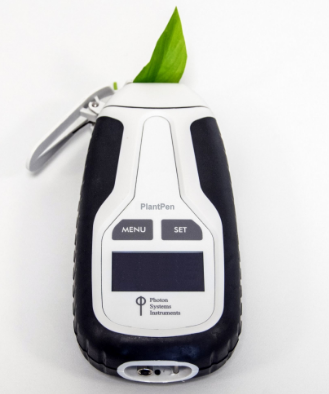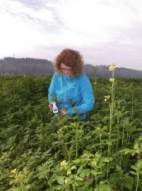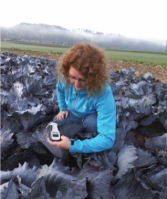用途:PlantPen系列植物PRI & NDVI計是一款小巧的快速測量植物反射光譜指數的野外便攜式儀器,可根據反射系數確定植物特征。通過各種反射系數可以評定葉綠素含量,和其他重要的特征。有兩個標準版本光化學反射系數(Photochemical Reflectance Index,PRI)和歸一化植被指數(Normalized Difference Vegetation Index,NDVI)。整合了藍牙技術(藍牙模塊或USB軟件狗),FluorPen 1.1軟件提供可視化操作和數據傳輸到PC上。根據用戶需要,還可提供定制服務。

兩種標準版本:
■PRI 210植物光化學反射系數計:在531nm~570nm波段之間測定葉反射系數。該參數對類胡蘿卜素極為敏感,反應植物的光合作用中的光能利用效率和CO2同化速率,并可作為植物水脅迫的可靠指數。因此廣泛用于植物產量和脅迫研究。
■NDVI 310植物歸一化植被指數計:用來測定NDVI(一種植物體葉綠素重要的指標),在660nm~740nm波長處比較反射光。葉綠素會強烈吸收紅光用于光合作用,而葉片細胞結構會強烈反射近紅外光。因此,NDVI與光合能力直接相關,從而反映植物冠層的能量吸收狀況。


應用領域:
■快速測量葉綠素含量;
■植物生物學;
■植物篩選和野外研究;
■脅迫生理學;
■農學和林學
功能特點:
攜帶方便、操作簡單。
直接無損測量得到NDVI和PRI值。
內置藍牙與USB雙通訊模塊,GPS模塊,輸出帶時間戳的地理位置
軟件可導出數據為Excel格式,具備實時控制和遙控功能。
可用于農業、林業以及植物學中光合作用、逆境脅迫等的研究和教學。
技術參數:
測量參數 |
PRI(光化學反射指數)=(R531-R570)/(R531 + R570)參考:Sellers等。(1985) NDVI(歸一化差異營養指數)=(R740-R660)/(R740 + R660)參考文獻:Rouse等。(1974年) |
測量光 |
PRI 210:內部雙波長光源R531 = 531nm,R570 = 570nm NDVI 310:內部雙波長光源VIS = 635nm,NIR = 760nm |
探測波長范圍 |
PRI 210: 500-600 nm; NDVI 310:620-750 nm |
軟件適用系統 |
Win7及以上 |
樣品夾 |
機械式葉夾 |
Bios |
可升級固件 |
存儲容量 |
16M |
通訊模式 |
USB或藍牙 |
內部數據采集 |
100,000個 |
顯示 |
圖形顯示 |
鍵盤 |
密封防水設計2鍵 |
自動關機 |
無操作5分鐘后 |
節電模式 |
自動休眠 |
電源 |
可充電鋰電池 |
充電方式 |
USB充電 |
電池容量 |
2000 mAh |
最大充電電流 |
0.5 A |
電池壽命 |
連續工作70小時 |
低電探測 |
顯示低電量報警 |
尺寸 |
135x 65 x 33 mm |
重量 |
188g |
工作環境 |
溫度0-55℃,濕度0-95%非冷凝環境 |
存儲環境 |
溫度-10~60℃,濕度0-95%非冷凝環境 |
產地:捷克
PlantPen 手持式植被指數測量儀參考文獻列表
BARTAK M., HAJEK J.., MORKUSOVA J., ET AL. (2018). Dehydration-induced changes in spectral reflectance
indices and chlorophyll fluorescence of Antarctic lichens with different thallus color, and intrathalline
photobiont. Acta Physiologiae Plantarum, 40(10).
DOI: 10.1007/s11738-018-2751-3
CROFT H. AND CHEN J. (2018). Leaf Pigment Content. Reference Module in Earth Systems and
Environmental Sciences.
DOI: 10.1016/B978-0-12-409548-9.10547-0
FERNáNDEZ-MARíN, B., GARCíA-PLAZAOLA, J. I., HERNáNDEZ, A., & ESTEBAN, R. (2018). Plant Photosynthetic Pigments: Methods and Tricks for Correct Quantification and Identification. Advances in Plant Ecophysiology Techniques, 29–50.
DOI:10.1007/978-3-319-93233-0_3
JABRAN K. AND DO?AN M. N. (2018), High carbon dioxide concentration and elevated temperature impact
the growth of weeds but do not change the efficacy of glyphosate. Pest. Manag. Sci, 74: 766–771.
DOI:10.1002/ps.4788
TRNKOVá K. AND BARTáK M. (2017). Desiccation-induced changes in photochemical processes of
photosynthesis and spectral reflectance in Nostoc commune (Cyanobacteria, Nostocales) colonies from
polar regions. Phycological Res. Volume 65.
DOI:10.1111/pre.12157
BARTáK M., HAZDROVá J., SKáCELOVá K., ET AL. (2016). Dehydration - induced responses of primary
photosynthetic processes and spectral reflectance indices in Antarctic Nostoc commune. CZECH POLAR
REPORTS 6(1): 87-95
MENDON?A L. L. R., ALVES F. R., CHAGAS E. N., et al. (2016). Management of Meloidogyne javanica with
biological pesticides and oils in a lettuce field. Nematoda. Volume 3.
DOI: 10.4322/nematoda.01515
LóPEZ-LóPEZ M., CALDERóN R., GONZáLEZ-DUGO V., ET L . (2016). Early Detection and Quantification of
Almond Red Leaf Blotch Using High-Resolution Hyperspectral and Thermal Imagery. Remote Sens.
Volume 8.
DOI:10.3390/rs8040276
BARTáK M., TRNKOVá K., HANSEN E.S. ET AL. (2015). Effect of dehydration on spectral reflectance and
photosynthetic efficiency in UMBILICARIA ARCTICA and U. HYPERBOREA. Biol Plant. 59.
DOI: 10.1007/s10535-015-0506-1
CALDERóN R., LUCENA C., TRAPERO-CASAS J. L. ET. AL. (2014). Soil temperature determines the reaction of olive cultivars to Verticillium dahliae pathotypes. PLoS One. Volume 9
DOI: 10.1371/journal.pone.0110664
CALDERóN, R., ZARCO-TEJADA, P.J., LUCENA, C. ET AL. (2013). High-resolution airborne hyperspectral and
thermal imagery for pre-visual detection of Verticillium wilt using fluorescence, temperature and narrowband indices, Remote Sensing of Environment. Volume 139 Pages, 231-245.
DOI: 10.1016/j.rse.2013.07.031
ZARCO-TEJADA P.J., GUILLEN-CLIMENT M.L., HERNANDEZ-CLEMENTE R. ET AL. (2013): Estimating leaf carotenoid content in vineyards using high resolution hyperspectral imagery acquired from an unmanned aerial vehicle. Agricultural and Forest Meteorology 171-172. Pages. 281-294.
DOI: 10.1016/j.agrformet.2012.12.013
JUPA R., HáJEK J., HAZDROVá J. ET AL. (2012). Interspecific differences in photosynthetic efficiency and
spectral reflectance in two Umbilicaria species from Svalbard during controlled desiccation. Czech Polar
Reports, Brno, Volume 2, Pages 31-41.
DOI: 10.5817/CPR2012-1-4
KOVáR, M., VEVERKOVá, E. AND ?ERNY, I. (2012). Utilization of Enfrared Thermography and Leaf Reflectance Indices in Evaluation of Effects of the Treatment of Sunflower (Helianthus annuus L.) by Biologically Active Compounds. Acta fytotechnica et zootechnica. Volume 15, Pges 23-28
SHRESTHA S., BRUECK H. AND ASCH F. (2012). Chlorophyll index, photochemical reflectance index and
chlorophyll fluorescence measurements of rice leaves supplied with different N levels. Journal of
Photochemistry and Photobiology B: Biology. Volume 113, Pages 7–13
DOI: 10.1016/j.jphotobiol.2012.04.008
ZARCO-TEJADA P.J., GONZALES-DUGO V. AND BERNI J.A.J. (2012): Fluorescence, temperature and narrow-band indices acquired from a UAV platform for water stress detection using a micro-hyperspectral imager and a thermal camera. Remote Sensing of Environment. Volume, 117. Pages 322-337.
DOI: 10.1016/j.rse.2011.10.007
CHYTYK, C. J., HUCL, P. J. AND GRAY, G. R. (2011). Leaf photosynthetic properties and biomass accumulation
of selected western Canadian spring wheat cultivars. Canadian Journal of Plant of Science. Volume 91,
Pages 305-314.
DOI: 10.4141/CJPS09163